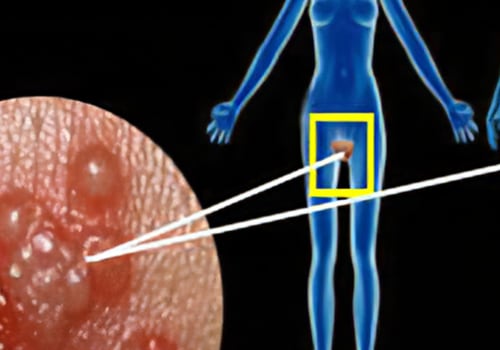For those who have been diagnosed with oral herpes, or suspect they may have it, antibody tests are a great way to get an accurate diagnosis. But what exactly are antibody tests, and how do they work? This article will provide an overview of antibody tests for oral herpes diagnosis, explaining the different types of tests available and how they can help in the diagnosis of this common condition. Antibody tests are a specific type of blood test that detects antibodies to a particular virus. These antibodies are produced by the body's immune system in response to the presence of a virus, and can be used to confirm a diagnosis. In the case of oral herpes, antibodies to the herpes simplex virus (HSV) are detected in the blood.
By measuring the levels of these antibodies, doctors can determine whether or not a person has contracted the virus. Antibody tests are an important tool in helping diagnose oral herpes. These tests are typically used to identify the presence of antibodies against the herpes simplex virus (HSV), which is the virus that causes oral herpes. Antibody tests are not intended to diagnose herpes infections, but they can be used to help detect whether or not someone has been exposed to the virus. In general, there are two main types of antibody tests that can be used to diagnose oral herpes: IgM and IgG tests. IgM tests look for antibodies in the blood that are typically produced in response to a recent infection, while IgG tests detect antibodies that are produced in response to a past infection.
It is important to note that a positive result for either type of test does not necessarily mean that a person currently has an active infection, but rather that they have been exposed to the virus at some point in their life. When it comes to interpreting the results of an antibody test, it is important to understand the difference between a positive and negative result. A positive result indicates that the body has produced antibodies against the herpes simplex virus and that the person may have had an active infection at some point in their life. A negative result, on the other hand, indicates that no antibodies were detected and that there is no evidence of active infection. When getting tested for oral herpes, it is important to know what to expect. The testing process typically involves taking a sample of blood, which will then be sent to a lab for analysis.
The results of the test will usually be available within a few days and can be accessed online or through the doctor's office. It is important to note that results may take longer if the sample needs to be sent out for further testing. In addition to understanding the different types of antibody tests available and what results mean, it is important to be aware of any potential risks associated with antibody testing. One potential risk is that false-positive results can occur due to cross-reactivity from other infections, such as chickenpox or mononucleosis. Additionally, some people may experience allergic reactions to certain components of the test or have other medical conditions that may interfere with results. Overall, antibody tests are an important tool in helping diagnose oral herpes.
They can provide valuable information about a person’s past exposure to the virus and help doctors make informed decisions about treatment options. It is important to understand how antibody tests work and what results mean before getting tested so that you can make informed decisions about your health.
Types of Antibody Tests
Antibody tests are an important tool in diagnosing oral herpes. There are several types of antibody tests used to detect the virus, each with its own advantages and disadvantages.ELISA
: Enzyme-Linked Immunosorbent Assay (ELISA) is a commonly used antibody test for diagnosing oral herpes. It works by detecting antibodies produced in response to the virus that causes oral herpes.The test is quick, reliable and accurate. However, it is not very sensitive and may not be able to detect very low levels of antibodies.
Western Blot
: Western blot is a more sensitive test than ELISA and is used to detect antibodies from the virus that causes oral herpes. The test works by detecting the proteins in the virus and is more accurate than ELISA. However, it is more expensive than ELISA.PCR
: Polymerase Chain Reaction (PCR) is a DNA-based test used to detect the virus that causes oral herpes.It works by detecting the genetic material in the virus, making it very accurate and sensitive. However, it is more expensive than ELISA or Western blot.
Understanding Test Results
When you get tested for oral herpes, the results of your antibody test can be a bit confusing. It's important to understand what your test results mean in terms of diagnosing oral herpes. Positive or negative results can provide valuable insight into whether or not you have an active infection.A positive result on an antibody test means that your body has produced antibodies to fight off a herpes virus infection. This indicates that you have an active infection, and you should seek medical advice if you haven't already. On the other hand, a negative result means that your body has not produced antibodies to fight off a herpes virus infection, and it's likely that you don't have an active infection. It's important to note that there is a possibility of false-positive or false-negative results from antibody tests. A positive result on an antibody test means that your body has produced antibodies to fight off a herpes virus infection. This indicates that you have an active infection, and you should seek medical advice if you haven't already. On the other hand, a negative result means that your body has not produced antibodies to fight off a herpes virus infection, and it's likely that you don't have an active infection. It's important to note that there is a possibility of false-positive or false-negative results from antibody tests.
This means that the results may not always accurately reflect your actual infection status. False-positive results may occur if your body is producing antibodies for another virus or disease, or if you had a recent herpes virus infection that has since cleared up. False-negative results may occur if your body hasn't had enough time to produce antibodies, or if the test was performed incorrectly. If you're not sure what your test results mean, it's best to speak to your doctor or healthcare provider.
They will be able to explain the results in more detail and advise you on how to proceed with treatment and care.
What to Expect When Getting Tested
When getting tested for oral herpes antibodies, there are several steps involved. First, you'll need to make an appointment with your doctor or a testing facility. Depending on your symptoms, the doctor may decide to order an antibody test. If so, you'll need to provide a blood sample for the test. Before the appointment, you'll need to fast for at least 8 hours.This means that you should not eat or drink anything (except water) during this time. It's also important to avoid strenuous physical activity and alcohol consumption prior to the test. When you arrive at the doctor's office or testing facility, you will be asked to provide a blood sample. The sample will be sent off to a lab for testing. It usually takes a few days for the results to come back. During the test, you may feel a slight pinch as the needle is inserted into your arm.
After that, you should feel no pain or discomfort. After the sample is taken, the area may be bandaged if necessary. To ensure accuracy of the results, it's important to follow all instructions given by your doctor or testing facility. This includes any pre-test instructions and keeping track of your results once they are returned. Getting tested for oral herpes antibodies can be nerve-wracking, but it's important to remember that it's a necessary step in getting an accurate diagnosis. By following your doctor's instructions and being mindful of your own needs, you can make sure that the process goes as smoothly as possible. In conclusion, antibody tests are an invaluable resource for diagnosing oral herpes.
It is essential to understand the various types of tests available, how to interpret the results, and what to expect when getting tested. With the proper knowledge and preparation, antibody testing can provide a sense of assurance and peace of mind regarding your health.






